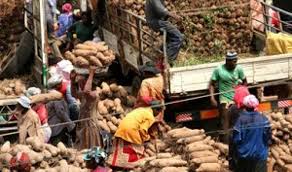
Planned Export Of 5,760 Tonnes Of Yam Rattle Consumers,
Recently, the Chairman of the Technical Committee on Nigeria Yam Export Programme, Professor Simon Irtwange, revealed that the federal government was targeting the export of about 480 tonnes of yams per month in 2018.
Daily Trust’s analysis showed that this would amount to a total of 5, 760 tonnes of yam in the entire year, which also equals about 240 containers of yam for the year.
The ambitious yam export rolled out for 2018 by the Committee may not be unconnected with the revelation in June last year by the Minister of Agriculture and Rural Development, Chief Audu Ogbeh, that the federal government was targeting about $8 billion as annual foreign exchange from yam exports to other countries.
The Committee disclosed that United States had made a request for the supply of five containers monthly in 2018, which amounted to 120 tonnes of yams.
“We are trying to aggregate the demand from other countries; so by the time we put everything together, we should be thinking of exporting about 20 containers of yams on a monthly basis. When you multiply 20 by 24, the total is 480 tonnes of yams,” Professor Irtwange disclosed.
However, a consumer who spoke to Daily Trust, Mr. Benjamin Ezra, expressed fear that the move would amount to mopping up yams from the domestic market, thereby causing yam scarcity and hike in price.
Mr Ezra said he understood and commended Nigeria’s drive to increase non-oil export, but it should be done in way that it would not hurt domestic consumption.
Another consumer, Esther Oghene, lamented that yam has been expensive since last year that the federal government started the yam export.
Oghene said that for the first time in the history of Nigeria, yam became more expensive than plantain.
She expressed fear that the farmer-herder clashes in Benue and Taraba States may affect yam production this year and exporting huge quantity of the few that can be produced will affect domestic consumption adversely.
Recall that in July last year, the yam export committee Chairman, Irtwange, allayed fears that yam exports would affect local consumption of the produce and lead to skyrocketing of price.
The Committee puts the estimated price of 100 tubers of yam at N10, 000 during harvest and six months after, the same quantity at N35, 000 in the domestic market.
Irtwange said, “The export of yam will serve as incentives for more yam production and we are developing schemes to ensure that. It is not every tuber of yam that has export quality and it is not also every tuber that meets export standard.”
The committee noted that “yams with no export quality will be left for local consumption or taken to factories to be processed into flour and yam chips.’’
This implies that there would be a deliberate mopping of quality yam for export while domestic consumption will grapple with the leftovers that could not meet export criteria.
An expert in agriculture, Mr. Emmanuel Emeka, said Nigeria should first commercialise yam cultivation in Nigeria before embarking on massive export drive.
Mr. Emeka told the Daily Trust that the current federal government’s approach of engaging local farmers and buying up the yams meant for the domestic market is not the best for the country.
“What the federal government should do is to map out an area for commercial yam farming and engage young Nigerians. The yams harvested from such big farms should be exported,” he advised.
He said farmers in communities should also be sensitised and supported with improved seedlings to increase the scale of their yam farming.
A retired civil servant, Mr. Tony Noriji, said the export of tubers of yam is an infringement of the provisions of the Export Prohibition Act of 1989 which prohibited the export of raw tubers of yam.
He said even if the country now has excess tubers of yam after meeting domestic need, the excess should be processed into in to flours and other by-products before export.
He said this would aid federal government’s industrialisation drive and also create jobs for the teeming youth.
On how to achieve the ambitious export plan, Professor Irtwange said, “We have a work plan and we have a lot of activities that we have already pencilled down. We are working with relevant government agencies to provide the necessary support for the programme.’’
The Committee disclosed that the Nigerian Ports Authority (NPA) had made available the Ikorodu Lighter Terminal to facilitate the packaging and movement of yams meant for export and that plans were underway for the construction of yam pack houses at the terminal.
On the challenges which yam exporters encountered in 2017, Irtwange said that the committee had forwarded a report to the Federal Government on possible ways of tackling the perceptible hitches.
“On the issue of transportation, we need cold trucks; we also need yam conditioning centres. Presently, there is only one conditioning centre owned by the Nigeria Export Promotion Council in Zaki-Biam, Benue State, but that is not enough, we need more,” he said.
Source: DAILY TRUST
